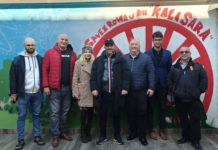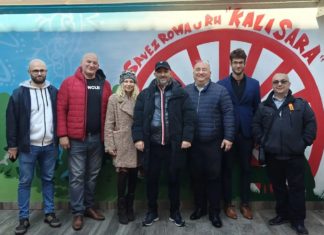The last term of the Croatian Parliament will be remembered for numerous cases of party jumping, stabilisation under the leadership of Andrej Plenković after a short political experiment between Croatian Democratic Union (HDZ) and Bridge of Independent Lists (MOST), the unprecedented crisis of the Agrokor company and the crisis caused by the coronavirus and the Zagreb earthquake.
We talked to Veljko Kajtazi, a Member of Parliament representing Austrian, Bulgarian, German, Jewish, Polish, Rroma, Romanian, Ruthenian, Russian, Turkish, Ukrainian and Vallachian minorities, about how has all this affected the Rroma.
Are you preparing for the upcoming parliamentary elections and do you have enough time for the election campaign?
Each of my terms as a Member of Parliament I perceive as a kind of preparation for new elections. In that sense, with three parliamentary terms so far, my campaign has been going on for nine years.
I never give up on my plans, so during each term I focused my work and enterprising activities on the realisation of the pre-election plan that I had presented to the voters. After each term I would pick up after the new elections where I left off during the previous term. It’s the same this time, all that’s left to do goes into my program for new elections. Therefore my work and my results are my election campaign.
We are no more objects of politics and there is no going back
What are the projects realised so far representing you in the best way to your voters?
During my terms in the Parliament, I managed to unite, I dare say, almost 80 percent of the Rroma population, which makes me extremely happy. The Rroma have become a political entity and, for the first time, have their own organisation and decide their own political destiny. We are no longer pawns of the interests of the big parties responsible for the catastrophic situation and decades of neglect of the Rroma problem. Only now can it be seen that our interests are no different from the interests of the majority people because every person deserves to have basic living conditions, water and electricity, and then they can take advantage of every opportunity provided. Croatian Rromani Union “KALI SARA”, whose candidate I was in the parliamentary elections, has grown into a strong, umbrella organisation that has enabled faster and more efficient implementation of projects related to improving the living conditions of the Rroma community in Croatia. It is precisely this connection and togetherness that has led to positive results. So I will say what I have launched and what we have realised together so far.
Living, not just surviving
The legalisation procedure that I initiated for 1,200 buildings in Rroma settlements has been fully completed, geodetic and other surveys have been done, and utility and other fees have been paid. Electrification and urbanisation of those settlements will follow, but it is unfortunate that we are talking about this in the year 2020. Within those Rroma settlements, I have also launched the construction of community centres and sports playgrounds, and so far we have built 15 multi-purpose sports playgrounds and three community centres, and the fourth will be completed very soon. Together with the Rromani Union “KALI SARA” we organise life in Rroma settlements, which so far has been reduced to survival. In Rroma settlements throughout Croatia, I also started the process of electricity supply, and we succeeded with the first realisations of public lighting infrastructure in settlements.
Legal and systematic solution of problems
Through legal acts, I managed to resolve some important issues related to, for example, status, the Foreigners Act, housing, legalisation, sterilisation and microchipping of dogs, and others. During my mandate, I submitted more than 20 amendments and all of them have been adopted, and this is extremely important for the systematic solution of problems within the Rroma community.

Education as a foundation for progress of the Romani community
Continuous work in the Parliament has certainly enabled me to launch and implement some capital projects for the Rroma, such as increased college scholarships for high school students (educational assistance) and university students, as well as the payment of incentives for completed three years of schooling in the amount of HRK 1,500.00 and four years of schooling in the amount of HRK 3,000.00, which can also be used for further education. Furthermore, we founded the Central Rromani Library in the Republic of Croatia and started the construction of the Rroma Memorial Centre Uštica, thus realising the long-term dream of every Rroma, including mine.
Could you briefly introduce us to these two recent projects that you have mentioned – Central Rromani Library and Rroma Memorial Centre?
In the first two terms, we moved from the street to the institutions, in the third we started building our own institutions, and in the fourth term we will have an even stronger influence on changing the perception of the Rroma.
We have implemented these extremely important projects for the Rroma community in cooperation with the Government of the Republic of Croatia and the City of Zagreb. Rroma have their own space in the centre of Zagreb of approximately 400 square meters, which allows them to organise and hold numerous events, such as regular meetings of members of the Rromani Union “KALI SARA”, project presentations to institutions, partners and international delegations and cultural events.
Within that space, on a total of 113 square meters, the Central Rromani Library “KALI SARA” has been accommodated. It is a centre of culture and events designed as an interdisciplinary space for the exchange of information and knowledge, and the collected material allows studying the history and development of the Rroma people, their travels, suffering and achievements. We will continue to collect material and archive it, to the satisfaction of all those interested in the literature on Rroma, such as scientists, students and researchers in Croatia and beyond.
Justice for Rromani victims after more than 75 years
As for the construction of the Rroma Memorial Centre in Uštica at the site of the suffering of the largest number of Rroma during the Independent State of Croatia, 80 percent of the work has been completed. In parallel with the construction of the facility, we are working on interior design, horticulture and preparing a permanent exhibition that will bring many, from schoolchildren to retirees, closer to the historical story of the missing and killed Rroma. The Rroma Memorial Centre Uštica will be opened with a special exhibition on August 2, the International Rroma Holocaust Memorial Day, and after that we will start the realisation of the permanent exhibition in accordance with the project design. How many people will be able to attend the opening of the Rroma Centre this August depends on the measures of the Government of the Republic of Croatia related to the coronavirus, but we will definitely plan the big opening ceremony for better times.
Radical change, not radicalism
We have all gone through a rather difficult and challenging period marked by a coronavirus pandemic, so can you tell us what the situation was like in Rroma settlements during that period?
It came to light what it was like to live in a crisis, and those in a state of permanent crisis found themselves in an even bigger problem. This group includes all socially disadvantaged people and, unfortunately, there are too many of them in our society. I hope that in the coming period what we have written in our Constitution will come to life, and that is the fact that we are also a welfare state. We have to face problems and change priorities, we need a radical change, not radicalism.
Even before this situation with coronavirus, together with the Rromani Union “KALI SARA” I donated packages with basic household necessities, firewood and household appliances to socially disadvantaged people – the elderly and the disabled, those who receive guaranteed minimum benefits, as well as single mothers. Also, in order to alleviate the situation caused by the virus, we donated humanitarian aid packages and basic disinfectants and organised delivery to all Rroma settlements in Croatia. I am happy that, to my knowledge, in Croatia no Rroma in a total of 60 Rroma settlements has been positive for the virus.
What kind of cooperation have you achieved with the other eleven minorities you represent over the past three terms?
I have always, from birth until today, lived in multinational environments, where Rroma have always been a minority. Such coexistence has taught me to fight for minority rights as well as for human rights in general. Therefore, from the first day of my arrival in the Parliament, I called on all those I represent to work together in the realisation of their projects or in solving problems that differ from one minority to another. Russians thus have more problems in resolving status issues, such as obtaining citizenship, Ruthenians are striving to establish the Ruthenian language as an elective course in the education system and to establish a master’s degree in Ruthenian language, while Jews have highlighted the issue of property restitution. I also advocated the recognition of the languages of all minorities that I represent in accordance with the European Charter for Regional or Minority Languages, bearing in mind that for now, in accordance with the declaration in the instrument of ratification, the provisions of the Charter apply to only seven languages – Italian, Serbian, Hungarian, Czech, Slovak, Ruthenian and Ukrainian. I have always gladly responded to all minority cultural events and manifestations, and for my work as a Member of Parliament I have received recognition from the Romanian, Polish, Russian, Ruthenian and Turkish national minorities. I have also had excellent cooperation with the embassies of minority communities, which I represent with the common goal of realising their interests. I am open to even more intensive cooperation, and if such a desire is mutual, I can express it in the upcoming elections.
During your parliamentary term, you also advocated for the development of international cooperation. Can you single out some of such examples for us?
I am proud to point out that the number and quality of implemented projects related to the Rroma national minority is a shining example for Croatia in the European Union. There is almost no country in Europe that has not heard, for example, about our celebrations of Rroma national holidays and the support provided by Croatian state institutions. Numerous cultural and artistic events that I have organised over the years in cooperation with the Rromani Union “KALI SARA” were an incentive to achieve excellent intercultural cooperation with other countries, such as Macedonia and Turkey. The cooperation with India, the homeland of the Rroma, is especially important to me, and being the Chair of the Croatian-Indian Parliamentary Friendship Group, I visited India in the organisation of the Embassy of the Republic of India to Croatia. It was a political visit, but at the same time it enriched me immensely as a human person whose memory will forever be marked by the events and encounters enriched by the culture and spirituality of this country and its people. I am glad that these trips were organised for our members as well. Some people have left their place of residence, county and country for the first time. Many have never seen the sea, and for many the first flight by plane was a special experience. I am glad that we managed to make that possible for our people as well. We all grew and learned together. The shifts are not only visible to the eye, but change and progress is also felt in the spirit of the people who finally see the light at the end of the tunnel.
What do you plan to achieve if you win a mandate in this parliamentary election as well?
In this answer, I will use sports vocabulary. My team and I won all the games we played so we are a winning team. We did not calculate because a draw is no longer enough for the Rroma community. Therefore, what we start we realise to the very end.
A census will be conducted next year, which is extremely important for members of the Rroma community because the Constitutional Act on the Rights of National Minorities stipulates a significantly different position for a minority that exceeds 5 percent of the total population. In addition to the two municipalities, Pribislavec and Orehovica, where Rroma have crossed this threshold, there are a number of other places where the number of Rroma is significantly higher than that recorded in the current census. If this threshold is exceeded, it would significantly increase the opportunities of the Rroma and change their position. In addition to being able to apply for various competitions, they could, for example, run in local elections. I firmly believe that after the next census and local elections, we will certainly have a deputy prefect, deputy mayor and several other deputy municipal heads, who will be able to influence changes in bylaws and legislation and their adaptation to the Rroma community. Therefore, we plan to organise ourselves and be well included in the census.
Also, the education system should be reorganised in accordance with the program of the Ministry of Science and Education in order to practically conduct preschool classes, which instead of the current 5 hours a day during the period of 10 months provides 5 hours a day for a two-year period when it comes to work with the Rroma children. Workshops would be organised for even younger children with the aim of getting to know the Croatian language and acquiring work habits.
As I managed to introduce fixed quotas for the members of the Rroma national minority at the University of Applied Health Sciences in Zagreb, I will continue to work with the University of Zagreb and all other faculties to do the same and thus change the educational structure of the Rroma in Croatia.
We will certainly hold the First Congress of Young Rroma in the Republic of Croatia, whose patron I am together with the Rromani Union “KALI SARA”, and which we had to postpone due to the situation with the coronavirus. I am proud that the organisers of the Congress are Rromani students, and young Rroma between the ages of 17 and 29 will attend it. In cooperation with the competent institutions and professional lecturers, lectures and workshops will discuss four very important thematic areas: employment, education, housing and the establishment of a scholarship fund. The realisation of these and other already launched projects is in the interest of the Rroma, but also for the benefit of all other citizens and I will continue it in cooperation with the Rromani Union “KALI SARA”.
During the implementation, we must show determination and unity, because there is no room for those who are trying to achieve their own political ambitions at the expense of the Rroma. We are persistent and consistent in our efforts to address individual problems in individual places with the aim of determining individual responsibility and sanctions, and not by generalising and calling out the entire national community.
Look, there’s a lot of it and it’s hard to single out what we’re all going to do in the future. Five years ago, no one knew we were going to do this much. The next term will be a definite break with the past and with the majority’s position on the Rroma community.
Can you finally tell us something about your life experiences, about what it is like to be a Rroma in today’s world?
I could talk for hours about being a Rroma in today’s world, so instead of endless explanations, I will use this opportunity to recommend my book to all readers – my autobiography, in which you will be able to learn about my life experiences. I have been preparing it for some time with my close associates and now it is in the final stage and I believe that during this year, in just a few months, it will go out of print and be available to all interested parties. Its title is The Dream of the Rroma, and I dedicated it to my mother who fought all her life for the majority communities to be accepted as equals.
I believe that my work in the Parliament has changed the perception of the majority population towards the Rroma and sent a clear message that the Rroma people do not belong on the margins of society.












